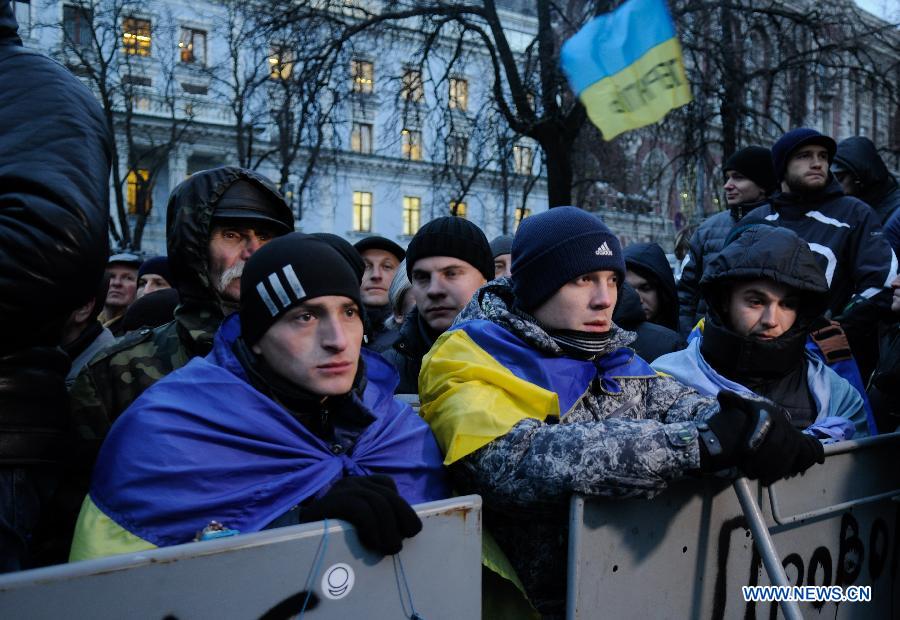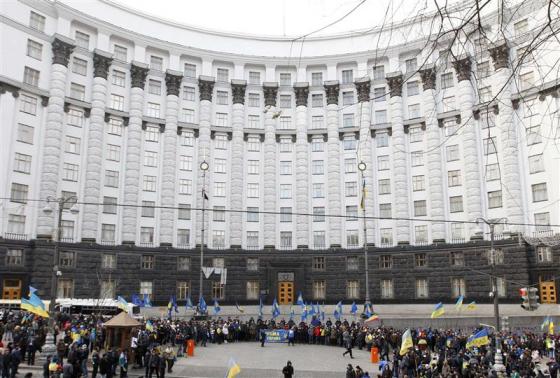www.aljazeerah.info
News, December 2013
Archives
Mission & Name
Conflict Terminology
Editorials
Gaza Holocaust
Gulf War
Isdood
Islam
News
News Photos
Opinion Editorials
US Foreign Policy (Dr. El-Najjar's Articles)
www.aljazeerah.info
Ukraine PM Calls for End to Tension, But Police Brace for Action,
December 4, 2013
(Reuters) -
 |
 |
Ukraine's embattled prime minister Mykola Azarov warned protesters on Wednesday they would be punished if they broke the law after he marshalled his ministers for a cabinet meeting despite an attempted blockade by demonstrators.
With a crisis over the government's rejection of closer ties with the European Union piling pressure on the creaking economy, one of Azarov's deputies departed for Moscow for talks including on Russian natural gas, for which Kiev is urgently seeking lower prices.
Tension stayed high in Kiev as black-helmeted riot police sealed off the approach road to the main offices of President Viktor Yanukovich, confronting several hundred protesters from behind steel barriers.
Protesters had threatened to tighten their blockade of key buildings in Kiev on Wednesday. Yanukovich himself flew to China on Tuesday, leaving behind a country in turmoil over his government's policy U-turn. Chinese state news agency Xinhua said Yanukovich was in Xian where he was due to visit the Terracotta Warriors archaeological site and an aircraft factory.
The crisis has exposed once more the East-West tug-of-war playing out in Ukraine, which has oscillated between the EU and former master Moscow since the 2004-5 Orange Revolution overthrew the post-Soviet political order.
Azarov's government survived an attempt to topple it in parliament on Tuesday in a rough encounter with opposition parties at which he apologized for police heavy-handedness in which scores of people were hurt.
But after Azarov and his ministers assembled for a cabinet meeting on Wednesday, he had recovered his poise and warned demonstrators not to take their action too far.
Azarov also said the government had demonstrated tolerance and a readiness for dialogue during the protests and he urged all political forces to avoid a further escalation of tension.
"Everybody must realize that the country's constitution and laws are in force, nobody is allowed to violate them ... All those who are guilty of illegal acts will answer for them," he said.
International markets kept up the pressure, driving the cost of insuring Ukrainian debt against default to a level not seen since January 2010. Ukraine faces gas bills and debt repayments next year of more than $17 billion.
Deputy Prime Minister Yuri Boiko departed for Moscow on Wednesday for talks on bilateral issues including natural gas, the Interfax news agency reported, citing a source in Ukraine's government.
Azarov implored opposition leaders on Tuesday not to try a repeat of 2004-5, when "Orange revolution" mass protests overturned a fraudulent election won by Yanukovich.
Trying to defuse protests, the government has defended its policy move by saying that this is only a "pause" in the moves to integrate further with Europe, rather than an about-turn.
As if to underscore this point on Wednesday, he announced delegations were heading to both Brussels and Moscow very soon.
FOOD, CLOTHING HANDOUTS
The United States weighed into the crisis on Tuesday.
"We urge the Ukrainian government to listen to the voices of its people who want to live in freedom and in opportunity and prosperity," Secretary of State John Kerry said in Brussels.
"We urge all sides to conduct themselves peacefully. Violence has no place in a modern European state."
About 350,000 Ukrainians massed in Kiev on Sunday in protest at the government's decision, under Russian pressure, to spurn the pact on closer trade relations with the EU, dismayed at what many of them saw as a defining rejection of Western integration in favor of deeper ties with Moscow.
Thousands are manning barricades made of plywood, park benches and the branches of an artificial Christmas tree around Kiev's Independence Square, epicenter of the Orange Revolution.
At Kiev's city hall, now an organizational hub for protesters who have occupied the building since Sunday, people dozed on the second floor while others passed through the revolving doors for handouts of food and warm clothing, as the harsh Ukrainian winter just begins to bite.
Hundreds of protesters, bearing the national flag or the standard of opposition political parties, rallied on Wednesday near official buildings, but found many routes blocked by vehicles which interior ministry forces had stationed across streets and approach roads.
"We don't like this government, young people in Ukraine want to join Europe. We want to be able to study and work freely in Europe, that is where Ukraine's future lies," said Christina Yavorskaya, 21, a student from the Chernobyl district in western Ukraine. "We want European salaries, a European way of life. There is no future with Russia."
"There is a chance of getting these bandits out of office. And as long as there is that chance, we'll be standing here," said Misha Skoropad, 38, who came on a bus from the western city of Lviv to protest near the presidential headquarters.
Yanukovich, a rough-hewn former electrician from Ukraine's Russian-speaking East, is due to stay in China until December 6, seeking loans and investment to head off a debt crisis.
His departure appeared to be a gesture of confidence that order could be maintained at home.
The opposition is a loose alliance of political factions ranging from pro-EU liberals to hardline nationalists, without a galvanizing figure in the mould of Yulia Tymoshenko, who co-led the Orange Revolution but was jailed for abuse of power after Yanukovich became president.
Some analysts see Vitaly Klitschko, a heavyweight boxing world champion and now leader of the opposition Udar (Punch) party, emerging from the pack, though he is largely untested.
"The Orange Revolution laid the foundation for this," said self-employed businessman Yegor Kitov, 45.
"But this movement is stronger because, while then it was political parties that were organizing the people, now we are organizing ourselves."
(Additional reporting by Gareth Jones in Kiev, Ben Blanchard in Beijing and Steve Gutterman in Mosocw; Editing by Gareth Jones and David Stamp)
|
|
|
|
||
|
||||||


